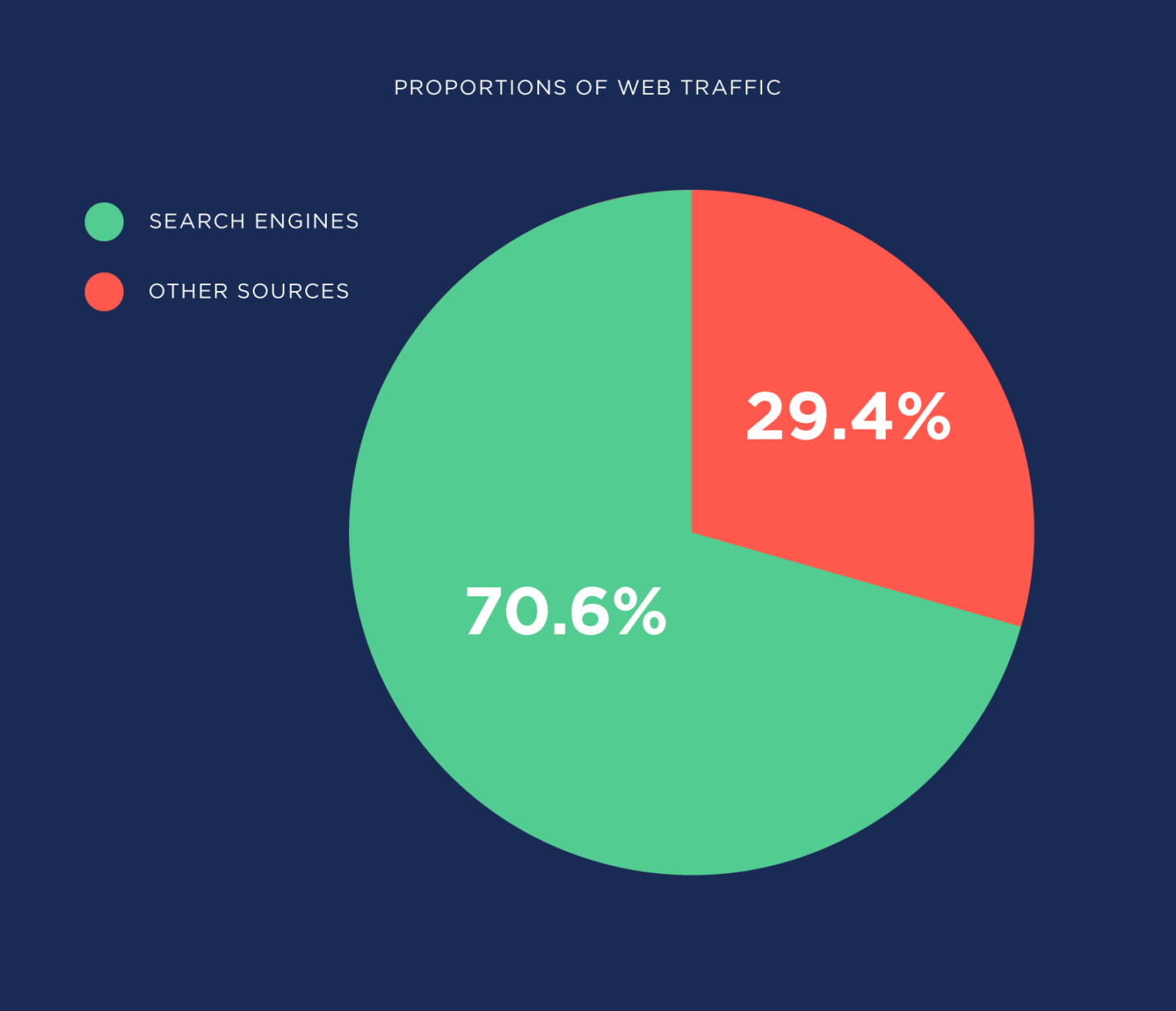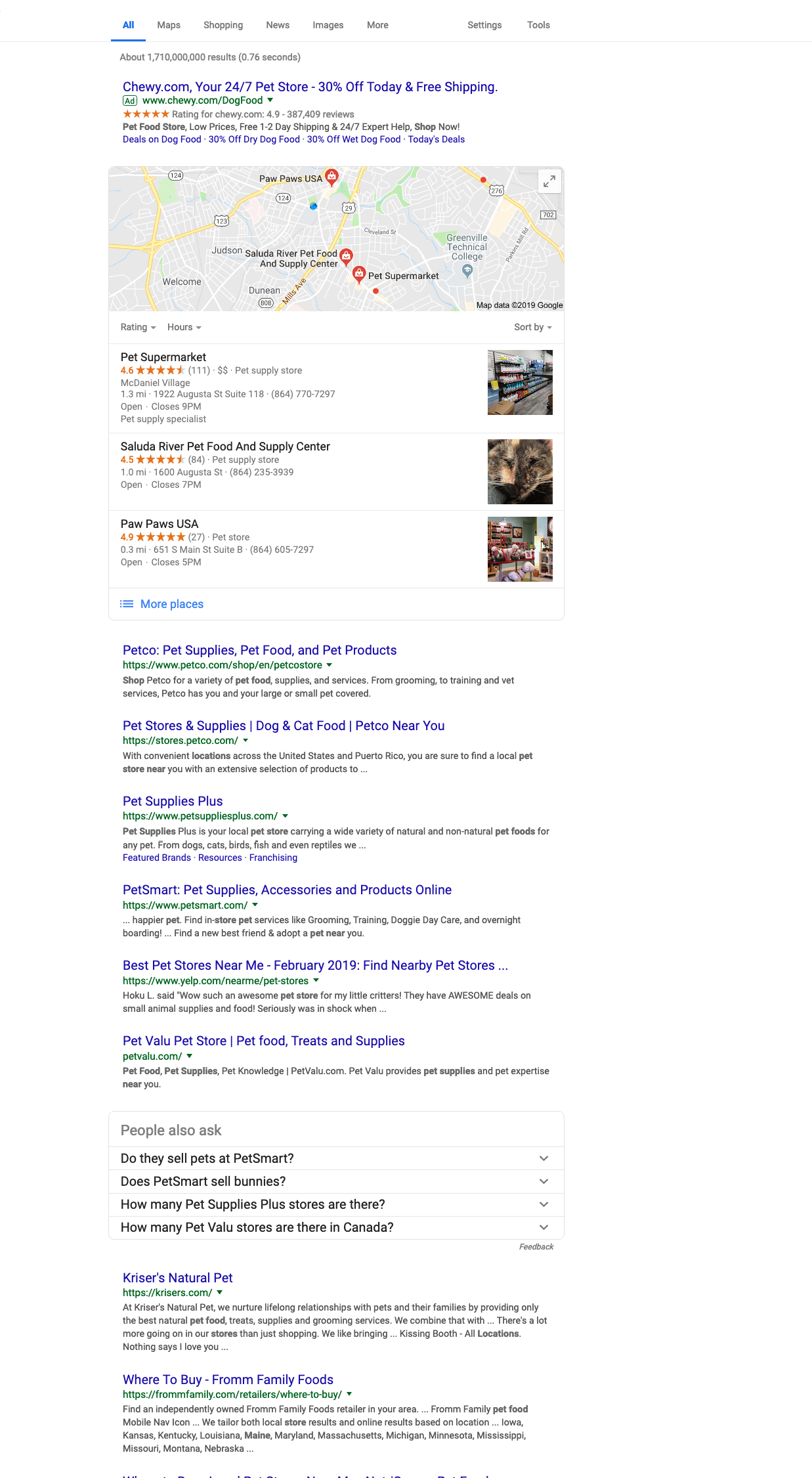3.5 billion Google searches are made everyday.
With a number that high, there’s no doubt that people are already searching online for something that your business offers. But how can you leverage all of that potential?
That’s where SEO comes in.
What is SEO?
SEO stands for Search Engine Optimization. Put simply, SEO is the practice of using search engines like Google and Bing to market your business and get your brand in front of the billions of people who are searching online each day.
And while search engines like Google do offer paid advertising methods, SEO is how you take advantage of the marketing potential that search engines offer without paying for ads. It’s a digital marketing discipline that has grown rapidly in recent years.
The SEO Effect
SEO is just a piece of any great digital marketing strategy, but it’s a pretty integral one. There are plenty of activities you could invest in to grow your business using the internet:
- Social Media
- Email Marketing
- Video / YouTube Marketing
- Facebook Ads
- LinkedIn Ads
The list goes on and on. One beautiful thing about SEO that sets it apart from other forms of digital marketing is this:
People are already looking for something.
If you buy ads on Facebook, you’re essentially disrupting someone who was browsing mindlessly through their feed. The majority of all website traffic on the internet comes through search engines. But neither of these come close to the number of searches made each day. You may catch their attention, but you might not.
On the other hand, when someone takes to a search engine, they’re already looking for something. If you make posts on Instagram, people see your post as their scrolling through hundreds of other photos of friends. This is the SEO effect.
SEO is about putting yourself in front of people’s questions and offering a solution.
How Many People Use Search Engines?
There are 2.32 billion Facebook users. There are 1 billion Instagram users. Almost 3.5 billion searches are performed every day.

For every 100 people who get on the internet, 93 of them start by performing a search.
Once there, they type what they’re looking for into a search bar. They click the “search” button and countless websites appear as results. These results are based on the search engine’s attempt to pair this person’s search request with the most relevant and helpful web pages. You’re probably familiar with this process, as you likely use search engines every day, along with most of the world. Once they type in and submit a search query, they see something like this:


As you can tell, there are more than just basic search results on this page, and a few different ways to get your business in front of people:
- Paid Ads: if you want to ensure you show up for a certain search (most of the time), you can invest in Google Ads and pay per click you receive.
- Organic Ranking: everything else you see on the page is what we refer to as organic. In other words, these results aren’t paid for, but earned. These are the results most people refer to when talking about SEO.
You may hear paid ads referred to as PPC (Pay Per Click) or maybe even SEM (Search Engine Marketing). In this post, we will be talking about and referring to organic search engine optimization, though Google Ads could be a viable digital advertising option for your business.
How Does SEO Impact My Business?
Back to the original question. The real answer is: if you’re not ranking well on search engines, it’s not impacting your business. You’re leaving 3.5 billion opportunities on the table every single day.
But if you are ranking on search engines, the impact could be tremendous. You could be generating thousands of additional visitors to your website each month. If your site is good at converting traffic into leads, you could have hundreds more leads each month. That’s how SEO impacts your business. The SEO effect is huge.
What Is the Goal of SEO?
For the majority of businesses, the goal of SEO is to gain leads from search engines, by:
- Increasing organic traffic
- Increasing keyword rankings
- Ranking for more keywords
In order to gain leads, you need organic traffic. And in order to gain organic traffic, you need to rank highly for keywords your audience is searching for.
What is a Keyword?
A keyword is simply a word or string of words someone types into a search engine. It could be “how to bake chicken without burning the pan” (guilty) or “personal injury attorneys near me.” A key component of SEO is making sure your website is optimized for keywords relevant to your business.
And the more real estate you take up, the better the chances someone winds up on your website. And the more often people land on your website, (theoretically) the more leads your business receives. Vice versa, the more keywords you rank for, the more Google real estate you take up.
How Can You Improve Your Rank?
There are thousands of factors search engines like Google consider when they give searchers results. There is lots of debate around what is actually a factor, versus what might just be a correlation. We won’t delve into all of them, but here are the two biggest factors:
- Relevance of content to search
- Quality and quantity of links to the page
As a local business, the other major factor would be local signals. If you want to rank better on Google, write content that’s relevant and valuable the the searcher, and gain backlinks. You could spend years becoming an expert on search, and we bet you’d wind back up at these two areas. These include your Google My Business listing, citations, reviews, and more.
We could spend hours attempting to break down Google’s search algorithm, but at the end of the day, these two factors continue to be the most important.
SEO Best Practices
There are countless resources on the web to help you get started, but here are just a few basics:. Because there are so many factors to consider, the list of best practices could be pages and pages long.
- Make sure you have a user friendly and easy-to-navigate website
- Create unique content your audience finds useful
- Utilize keywords in your site copy that your audience is searching for
- Create title tags and meta descriptions
- Share your content on social media networks and with industry influencers
- Implement tools like Google Analytics and Google Search Console to help you track your progress
- Make sure your website isn’t full of technical errors
If your website is the heart of your marketing strategy, a sound SEO strategy is the vein that pumps blood to it. Don’t miss out on the SEO effect.
Monitor your SEO progress with an all-in-one SEO tool like SEMRush. It may only be a single piece of your strategy, but without it, no one will find your content or learn about your business.
If you aren’t investing in SEO, you’re leaving your biggest opportunity for driving website traffic untapped. A poor or non-existent SEO strategy has a direct effect on your bottom line, and as time passes, the effect only grows larger. This means you’re getting traffic, leads, and sales slip through your fingers.


